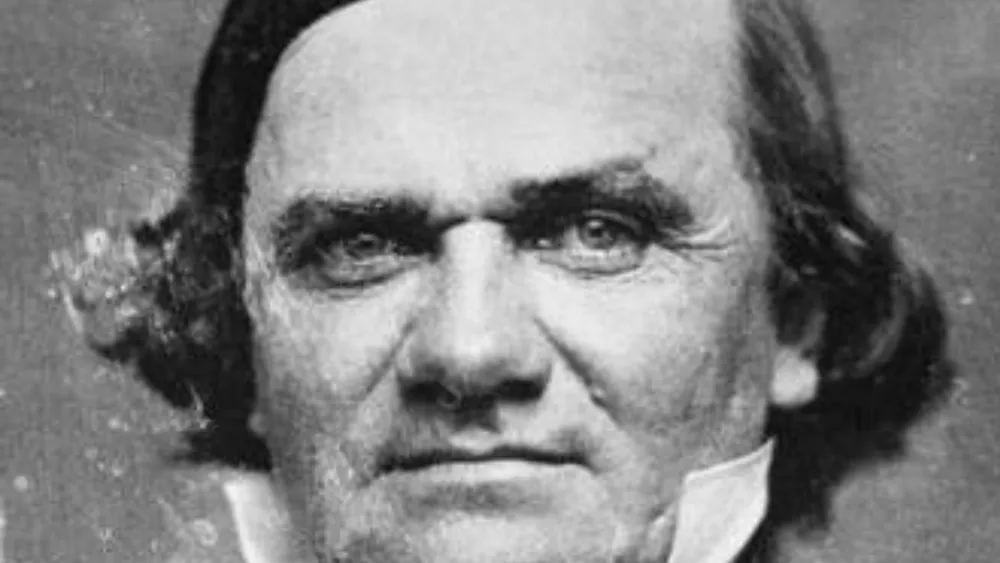In American political history, few figures loom as large as Stephen Arnold Douglas. A man of remarkable wit, intellect, and political savvy, Douglas played a pivotal role in the unruly era leading up to the American Civil War.
Nicknamed the ‘Little Giant’ for his small stature but formidable influence in politics, Douglas was a complex and controversial figure who made a lasting impact on the nation’s history.
His charisma and eloquence captivated audiences nationwide, making him a household name and a central figure in one of the most critical periods of American history.
The Beginning of a Legal Career
A low-income family welcomed Stephen Arnold Douglas into the world on April 23, 1813, in Brandon, Vermont. His early life was marked by hardship and tragedy. His father died when he was only two months old, leaving behind his mother, Sarah Fisk Douglas, to raise him and his siblings.
Sarah’s determination and resilience were instrumental in shaping the young Stephen’s character, instilling in him the hard work and self-reliance values that would define his later career.
In 1833, seeking a fresh start and new opportunities, Douglas made a pivotal move to Jacksonville, Illinois, where he lived with his uncle. In this burgeoning Midwestern town, he began to chart his course toward a distinguished career in law and politics.
He enrolled in the Canandaigua Academy in New York, furthering his education and honing his intellectual prowess.
However, it was at Yale College that Stephen Douglas solidified his aspirations. His legal studies there gave him a solid governance, justice, and the law foundation.
Equipped with the knowledge and skills he had gained, he returned to Illinois, ready to embark on his journey as a lawyer and, eventually, a statesman.
Stephen Arnold Douglas and His Rise to Political Prominence
His staunch support marked Douglas’s political entry into the Democratic Party. His eloquence and oratorical skills quickly drew attention, and he was elected as the state’s attorney in 1834.
From there, he served in various political roles, including the Illinois State House of Representatives and the Illinois Supreme Court. When he won the House of Representatives in 1843, it was evident that Stephen A. Douglas was a rising star in American politics.
One of Douglas’s defining moments came in 1854 when he unfolded the Kansas-Nebraska Act. This controversial legislation would repeal the Missouri Compromise of 1820. Therefore, it allowed the residents of these territories to decide whether to permit slavery. This is a concept known as “popular sovereignty.
This measure was meant to appease Southern slaveholders and ease the sectional tensions brewing. However, it had the opposite effect. It reignited the slavery debate and intensified the divide between North and South.
Presidential Ambitions of Stephen Arnold Douglas
Douglas had long harbored presidential ambitions, and in 1860, he sought the Democratic nomination. However, his support for popular sovereignty and his perceived pro-slavery stance alienated many Northern Democrats.
Consequently, the Democratic National Convention in Charleston, South Carolina, was fraught with division, and the party split along regional lines.
Southern Democrats nominated John C. Breckinridge, while Northern Democrats nominated Douglas. The split in the Democratic Party played a role in the election of Abraham Lincoln as the first Republican President of the United States.
The specter of the Civil War loomed large during this time. Moreover, Douglas’s attempts at compromise, his support for the Union, and his steadfast loyalty to the United States cannot be understated.
Although he was a Northern Democrat, his commitment to preserving the Union was unyielding. He believed that the nation’s survival hinged on avoiding a civil war. Moreover, he also made every effort to reconcile the North and South.
He was the driving force behind the passage of the Crittenden Compromise, a last-ditch effort to prevent secession, but it failed to gain traction.
Historical Assessment
Stephen Arnold Douglas’s legacy is complex, reflecting the nuances of his times and the challenges he faced. On one hand, he was a pragmatic politician who sought to navigate the treacherous waters of American sectionalism.
His doctrine of popular sovereignty, while aimed at maintaining national unity, inadvertently deepened the divisions that would lead to the Civil War.
However, Douglas should also be remembered for his commitment to the Union. Throughout his career, he consistently prioritized the preservation of the United States, even if it meant compromising his principles.
His pivotal role in the Lincoln-Douglas debates, a critical moment in American political history, showcased his dedication to the democratic process and the power of civil discourse.
Ultimately, Stephen A. Douglas’s contributions to American politics and the national conversation were significant.
Stephen Arnold Douglas on Compromise and Reconciliation
Stephen’s enduring legacy serves as a poignant reminder that, even in the most turbulent moments of history, there exist individuals who dedicate themselves to the pursuit of common ground and reconciliation.
He demonstrated the value of statesmanship, compromise, and moral leadership. Stephen did this by navigating the perilous seas of American politics. This was when the country was on the verge of a devastating civil war.
History has not always been kind to Douglas. Particularly in the eyes of those who see his popular sovereignty stance as exacerbating the divisions leading to the Civil War. But it is crucial to recognize the immense challenges and moral dilemmas he faced.
Despite the personal and political costs, his loyalty to the Union showcases the profound struggles of leadership during a national crisis.

A Compelling Narrative of Unity and Determination
In an era marked by the bitterest of rivalries and the deepest ideological divides, Stephen A. Douglas, the “Little Giant,” remains a testament to the complexities of political leadership. His life and career reflect the delicate balancing act required of leaders navigating a nation on the brink of war.
Ultimately, he leaves us with a compelling narrative of a man who, in pursuit of unity and the American experiment, faced the stark realities of his time with unending determination and a commitment to the greater good, even when history rendered a harsh judgment on his choices.










